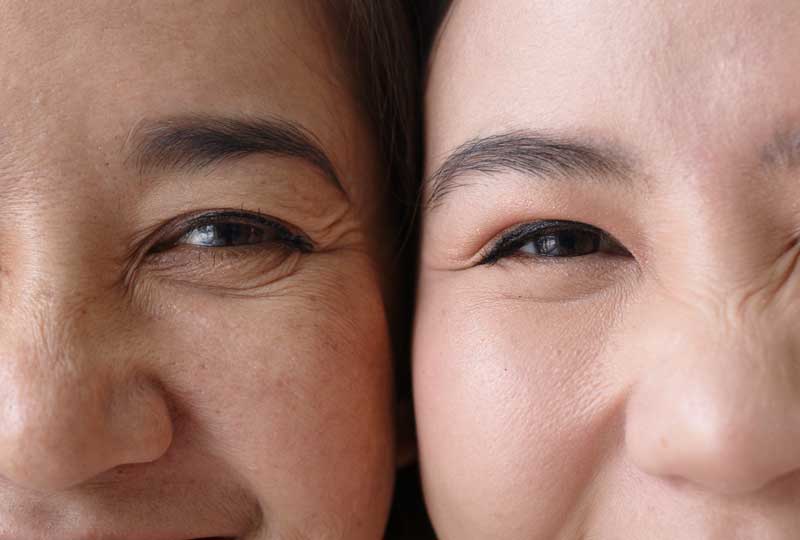Some common eye conditions like glaucoma and age-related macular degeneration can run in families. Knowing your family eye health history can help reduce your risk of developing genetic eye diseases.
Many people are unaware that certain eye conditions can be hereditary, meaning they can be passed down through generations of families. And the risk of developing these genetic eye diseases can be much higher than you might expect. For instance, those who have a family member with glaucoma are four to nine times more likely to develop the same eye disease themselves, according to the Glaucoma Research Foundation.
How to reduce your risk for genetic eye diseases
Caring for your eyes by understanding your family history of eye conditions, getting regular eye exams, wearing protective eyewear and leading a healthy lifestyle are all proactive steps toward preserving the precious gift of sight. Here are five things your family members can do to improve their Eye-Qs.
1. Know your history.
The next time you’re chatting with relatives, ask if anyone knows about eye problems in the family. Be sure to share what you learn with your eye doctor to see if you need to take steps to lower your risk for genetic eye diseases. Not only should you ask family members about their eye-related diseases, but you should also let them know if you have a condition that has been diagnosed by an eye doctor.
Getting older also increases your risk of some eye diseases. You might also have a higher risk of some eye diseases if you are overweight or obese, have a family history of eye disease or are African American, Hispanic or Native American. “Systemic health conditions,” explained Dr. Shriji Patel, an ophthalmologist with the Vanderbilt Eye Institute, “like diabetes or high blood pressure, can have an effect on the eyes. For example, people with diabetes are at risk for diabetic retinopathy, the leading cause of visual impairment in working-age adults worldwide.”
2. Find a good eye doctor.
Patel suggests that one of the most important steps to take for keeping your eyes as healthy as possible is to find an eye doctor you can trust.
“Many potentially blinding eye conditions don’t have any early warning signs, so you could have a problem and not know it,” Patel said. “Find an eye doctor by asking friends and family if they like their doctor. You can also check with your health insurance plan to find eye doctors near you or choose from one of the excellent providers at the Vanderbilt Eye Institute. Before visiting the eye doctor for the first time, you should find out if you need to have your eyes dilated. It’s the only way to detect certain eye diseases early, when they’re easier to treat and before they cause vision loss. Your eye doctor will decide how often your eyes need to be dilated based on your risk for eye diseases.”
3. Wear sunglasses regularly.
Patel points out that another step we can take to keep our eyes healthy is to make a habit of wearing sunglasses outside, even on cloudy days. Just as UV rays are harmful to our skin, they can also damage our eyes. “Wearing sunglasses that block 99 to 100 percent of both UVA and UVB radiation can protect the eyes and lower your risk for developing cataracts or macular degeneration,” Patel said.
4. Eat an eye-healthy diet.
Eating healthy foods and being physically active is good for overall health, and it helps prevent some of the health conditions that can put you at risk for eye problems, too. Eat right for your sight by adding more eye-healthy foods to your plate each day, such as dark, leafy greens like spinach, kale and collard greens. Some fish, including halibut, salmon and tuna, which are high in omega-3 fatty acids are excellent options, too.
You should always check with your doctor before changing your diet if you are taking certain medications. Be active most days of the week with movement that gets your heart rate elevated for 30 minutes or more to lower the risk of conditions that can contribute to vision problems such as diabetes, high blood pressure and high cholesterol. If you smoke, take steps to quit. Smoking increases your risk of diseases like macular degeneration and cataracts, and it can harm the optic nerve.
5. Protect your eyes.
The National Institutes of Health National Eye Institute recommendations for eye health include wearing protective eyewear such as safety glasses and goggles during certain activities. Protective eyewear is designed to safeguard your eyes while engaging in sports, construction work or home repairs. You can buy them from most eye care providers and some sporting goods stores.

Comprehensive eye care
The ophthalmologists and optometrists at the Vanderbilt Eye Institute treat a wide array of eye diseases that affect eye health and vision. Comprehensive care includes primary eye care, vision screening, surgeries for conditions such as glaucoma and cataracts, and other treatments and surgeries for disorders of the eye.

